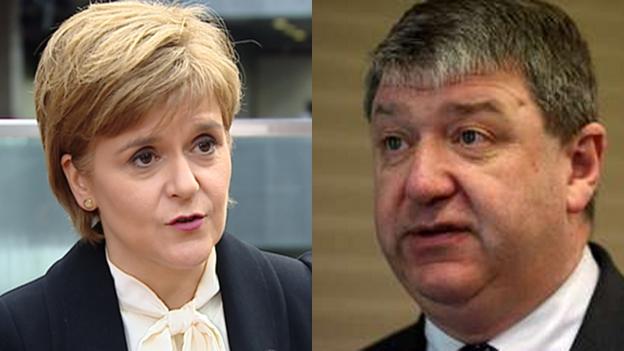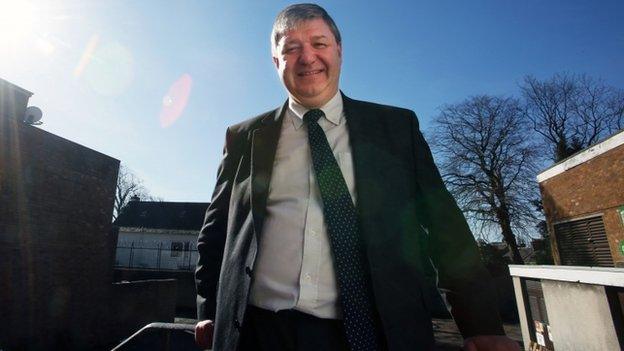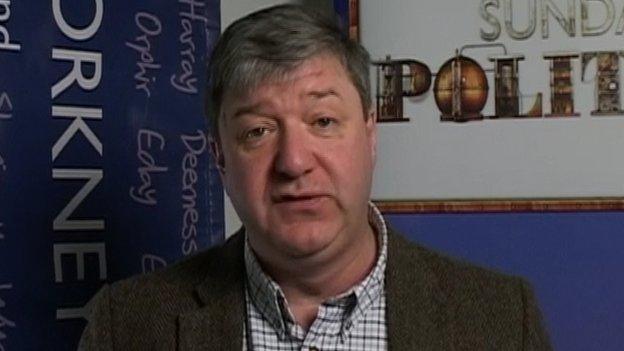Q&A on Alistair Carmichael court case
- Published
A legal challenge over the election of Liberal Democrat Alistair Carmichael as Orkney and Shetland MP is taking place in Edinburgh. Here we explain the background to the case and why it is being broadcast live.

What is the case about?
Four of Alistair Carmichael's constituents have raised the legal action
They say he misled the electorate over a memo, published in the Daily Telegraph, external on 3 April this year, claiming that SNP leader Nicola Sturgeon wanted David Cameron to be re-elected prime minister.
Mr Carmichael had initially denied leaking the alleged details of a conversation between Ms Sturgeon and the French ambassador, Sylvie Bermann.
He claimed the first he had heard of it was when he received a phone call from a journalist.
However, the MP - who is not obliged to attend the two-day hearing - later admitted full responsibility for sanctioning its release, and accepted the "details of the account are not correct".
The constituents, who have brought the case through crowd-funding, said the MP's actions called into question his suitability to represent the constituency.

Has Scotland seen a court hearing like this before?
This is the first parliamentary election petition to be brought in Scotland since the Grieve V Douglas-Home case of 1965.
That saw Scottish poet and one-time Communist candidate, Hugh MacDiarmid - who was born Christopher Murray Grieve - attempting to unseat former prime minister Alec Douglas-Home who at the time was MP for Kinross and West Perthshire.
MacDiarmid had claimed that the Conservative politician's election was void because he had participated in a national party election broadcast on behalf of the Conservative Party and had declared the costs of this on his election expenses.
The court found that no offence had been committed, either by the candidate or the broadcaster. The court accepted that the intention was not to promote the candidature of Mr Douglas-Home in his own constituency but to provide general information about the party to the general public.

Have cameras been used in court before?
In 1994, independent production company Lion Television persuaded a Scottish judge to allow a TV crew to film an armed robbery trial in the sheriff court.
Unlike south of the border, filming in Scottish courts is entirely up to the discretion of the trial judge.
Filming and broadcasting in English and Welsh courts are currently banned under Section 41 of the Criminal Justice Act 1925 and Section 9 of the Contempt of Court Act 1981.
The Judicial Office for Scotland currently receives between three to four requests to film in court each year.
And earlier this year a judge-led group which was appointed to review the current policy on the recording and broadcasting of proceedings from Scottish courts.
It recommended that filming of legal debates in civil first instance proceedings may be allowed for live transmission, subject to clear and comprehensive guidelines.
Although those recommendations are some way off being enacted, this court case was seen as "exceptional" and a case for broadcast was successfully accepted.

Where and when will it happen?
The election court is set to sit for two days at the Court of Session in Edinburgh and will be heard in front of Lady Paton and Lord Matthews.
At a previous court hearing, it was decided that the petition should take place in Edinburgh rather than on one of the two island groups which make up the constituency of Orkney and Shetland.
In order for constituents to see for themselves what is happening in court, the Scottish Courts and Tribunals Service agreed that STV could broadcast the proceedings live with other media being allowed to use footage.

Where can I see it?
While STV is in charge of the cameras and production of the broadcast it has agree to give the footage to other media.
You can see the two-day hearing on STV Glasgow and STV Edinburgh channels which can be found at Freeview channel 23, Sky channel 117 and Virgin channel 159.
The coverage will be available to watch online at stv.tv, external and will also be available on YouTube.
The court proceedings can also been seen by clicking on this link.
The court has also agreed that journalists will be allowed to use Twitter to tweet live from the courtroom during the course of the hearing.
You can also keep up-to-date by following our reporter Philip Sim's twitter feed @BBCPhilipSim, external.
- Published1 September 2015

- Published21 August 2015

- Published8 July 2015

- Published6 July 2015

- Published2 July 2015

- Published29 May 2015

- Published22 May 2015
